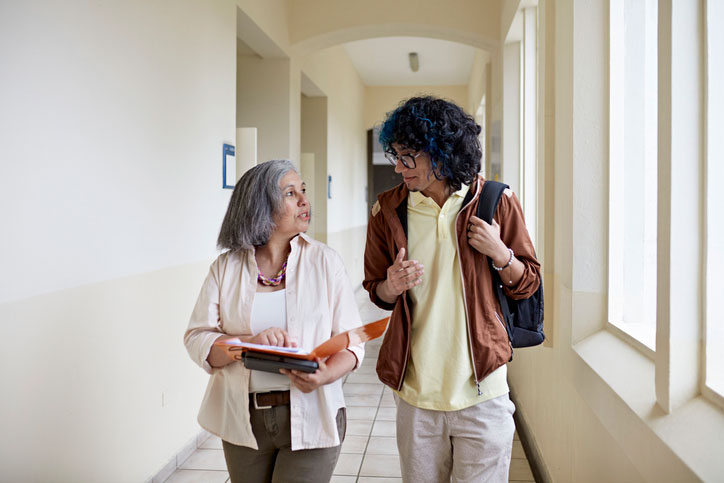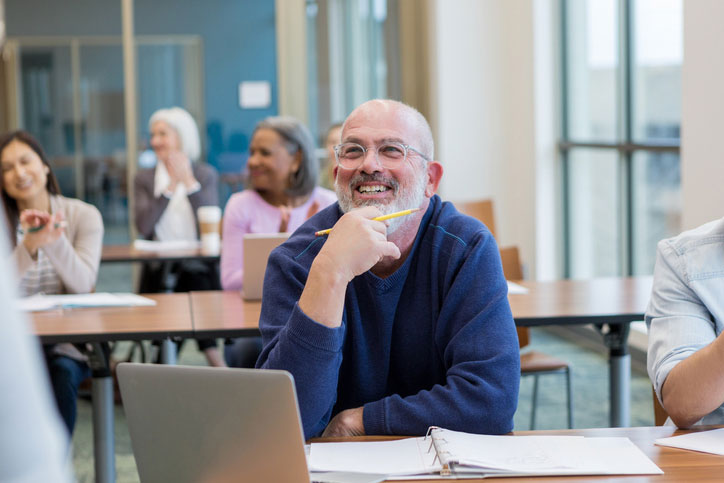Written by Scott Wilson

If there’s a truth about human nature, it’s that we are hard-wired to help one another. As social creatures, community is a feature that is built in. Almost all people recognize that our individual well-being rests in part on our collective well-being—that if our neighbors are not doing well, we are also likely to be a little worse off.
So you could say that pretty much everyone has the humanity in them it takes to become a social worker. What will separate you from the rest is both the intensity of that concern, and your persistence in following the path to becoming a qualified social worker.
Becoming A Social Worker in Florida Means Digging Deep and Working Hard
To get to most Florida social work jobs, it’s an effort that stretches over years of formal education and on-the-job training. It requires looking into your own heart in ways that make many people uncomfortable. And it calls for confronting some of the worst elements of culture and society in ways that most people never have to.
The fact that Florida social work careers are so challenging is also a sign of how much they are needed.
In Florida, that can be a particular challenge. It’s a state where social work itself is under attack today. The basic precepts of the field are attacked for being too woke, for highlighting vulnerabilities and biases that some folks would rather sweep under the rug. Even the ability to provide the standard comprehensive diversity, history, and social justice education required for competent social workers is being chiseled away through laws like the Stop WOKE Act.
But if you’re ready to overcome both your own doubts and those few elements of society who stand for injustice and inequity, here’s how you can become a social worker in Florida.
Florida Has a Unique Level of Need in Every Area of Social Services
The fact of the matter is, there may be no state in the country in which social workers are more important today. Not only are they critical to helping people with immediate needs; they are also on the front line of securing the rights and well-being of Floridians in the future.
Those threats are expanding in the Sunshine State. A 2023 analysis by the Southern Poverty Law Center found 114 hate and anti-government groups based in the state, from neo-Nazi’s to anti-LGBTQ+ groups, the second-highest number in the country. More troubling is that number has doubled in only two years, from only 53 found in 2021.
You have to have been hiding deep in the Okefenokee not to recognize that the state government is starting to lean in the same ideological direction as some of these organizations in Florida.
Despite the challenges, or maybe because of them, social workers are in high demand across Florida today. According to the Bureau of Labor Statistics (BLS), job demand here for most categories of social worker are expected to skyrocket by 17 percent over the next decade, far faster than what’s expected for almost any other job category, both here and across the country.
But because of those same challenges, you absolutely need the right qualifications to practice social work in Florida. And the steps here in this guide will show you exactly how to get that done.
Exploring the Ways You Can Be the Change Here in Florida
If you didn’t know already, social work is a vast field, with many levels of practice and different areas of specialization.
Figuring out how to become a social worker often first means deciding what kind of social worker you want to be.
The path to each of those roles and specializations is unique. There are branches and forks in the road; for many people, it’s a trail that winds through both life experience and education along the way, and sometimes leading to unexpected destinations.
Your Career Plan Needs to Consider the Level of Social Work Practice You Want to Focus on in Florida: Individual, Community, or System

First, it’s important to understand that social work practice breaks down conceptually into three major buckets.
Micro Social Work – Micro work happens directly with individuals, small groups, and families. It is the most personal kind of social work, emphasizing direct intervention and assistance for specific needs and challenges. This sort of tailored, personal work often involves clinical therapy.
It’s not just that the day-to-day work can vary between them; each level may also have its own licensing requirements, educational needs, and certification options.
All those factors will be a part of your own path to becoming a social worker in Florida.
Picking a Specialization as a Florida Social Worker
Florida is a positively enormous state, with the third largest population in the country. That population is riotously, flamboyantly multicultural… newly arrived Jewish retirees mixing with Haitian refugees, Cuban-Americans with deep roots and proud conservative traditions colliding with colorful LGBTQ+ communities in Miami.
Put all of them in an upside-down boot and shake it up with a hefty helping of poverty, drugs, racism, and a lot of crocodiles, and you’ve got Florida.
Clearly, there is a lot of room for specialization when trying to meet the needs of all those populations. In fact, there’s even a need for micro-specialization—bilingual licensed clinical social workers who help patients with epilepsy are a thing in Florida.
But you will find all these major kinds of specialty fields in demand across the Sunshine State.
- Geriatric Social Workers - In a state with almost 5 million resident adults over the age of 65, and many more here for part of the year, social workers who can handle their special requirements for assistance, therapy, and care are always in need.
- Healthcare - Florida’s healthcare system comes out at 36th in the nation according to The Commonwealth Fund’s 2022 evaluation. That creates a big need for social workers in this focus area to help shepherd people to better care options and to find ways to pay for the medical attention they need.
- School and Child Welfare - Kids are important everywhere, but kids here may find the world more confusing than most. With centers like FSU’s Florida Institute for Child Welfare on the job, social workers in this field can make a difference for our future.
- Mental Health and Substance Abuse - New changes in Florida law regarding involuntary commitment and evaluation through the Baker Act is making social workers in this specialization more important than ever.
- Forensic - With the third highest prison population in the nation, Florida has a revolving door of ex-cons in need of assistance in resettling and reintegrating with society—social workers specializing in forensic work are their best hope.
You will find that your choice of specialties influences the steps you take to become a social worker. One path may require more focused education; another may need a specific degree level.
Not All 7 Steps Apply to All Florida Social Workers
Not all these steps will apply to every kind of role in the field. You may find yourself fully qualified and able to begin your career even after step 1. But the branches of possibilities in Florida social work sprawl like the canopy of a live oak. Chances are, you’ll find your way somewhere along this general path.
1. Earn a Bachelor of Social Work (BSW) Through a CSWE-Accredited Program in Florida or online
It’s true that there are many entry-level social services jobs available in Florida to folks who even have just an Associate Degree in Human Services or similar. A Human Services Specialist with Work Opportunities Unlimited in Palm Beach Gardens is no less important than a master’s-prepared clinical social worker.
But, without splitting hairs too much, the fact is these people aren’t legally able to describe themselves as social workers in Florida. And what they can do doesn’t really take in the full scope of social work as a profession.
The clearest path to qualifying for actual intermediate social work jobs and to prepare for licensed practice in Florida, a Bachelor of Social Work is really the minimum.
There’s a reason for that. These four-year programs put together important general knowledge and critical reasoning skills that are valuable in any kind of work environment with key foundational training in psychology and social services. Your communication and problem-solving skills, as well as your understanding of the world, are built up with a classic liberal arts education.
At the same time, you’ll find classes that expand your understanding of social justice, human development, and modern social work practices on the menu. Most Florida BSW programs also include some level of field experience, putting you directly into placements with active and effective human services agencies, such as with CDS Family and Behavioral Services in Gainesville.
Some BSW degrees allow specializations in areas ranging from advocacy and social justice to military social work. You can get a jump on your area of interest by selecting concentrations that align with different kinds of roles. But there’s also plenty of room in the typical four-year degree program to pull together electives from a diverse set of multidisciplinary fields that can feed your distinctive social work career goals.
Offramp 1: Social Work Career Options in Florida with a BSW
You will have plenty of opportunities for meaningful and effective social work even if you decide to stop right here after step one. All kinds of social work careers at the intermediate, mezzo level, and even the big picture macro level of social work can be performed with only a bachelor’s degree.
These are most often jobs in coordination and case management, but they can be found in every sort of social work specialization. You can beef up your resume for such work through additional classes in business, communication, or even specialist topics like healthcare or accounting.
Most often, however, people with a BSW aren’t really stopping at this point, but just taking a little pause. A few years of work in this level of social work can make you an even more capable, empathetic, and motivated candidate for a Master of Social Work.
2. Earn a Master of Social Work (MSW) Degree From a CSWE-Accredited Program in Florida or Online
The state of Florida has only two permanent social work credentials for licensed practice; both of them absolutely require a Master of Social Work (MSW), earned from a CSWE-accredited college.
There are twelve of those colleges in Florida. They offer a wide range of specializations and two options for picking up that MSW: traditional and advanced standing.
The Advanced Standing Master of Social Work requires that you previously picked up a BSW (see step 1!); if that program was also CSWE accredited, it can shave a year of your studies so you can get your ASMSW in only one year.
Like most master’s degrees, you can pursue a traditional MSW with almost any sort of bachelor’s degree under your belt, but it will take you two years.
Traditional MSW degrees consist of a foundation year and a specialization year; Advanced Standing MSW programs include only the specialization year.
Although it’s called a specialization year, you may not have to pick a specialty in the traditional sense—instead, it can be a generalist curriculum that teaches advanced practice skills. In either case, it will come with supervised field experience, usually around 500 hours of closely overseen practicum placements working with real clients and solving real problems.

You’ll also find that some MSW programs in the state are either focused on or offer specializations in clinical social work. Others may describe themselves as generalist programs, which don’t include in-depth psychotherapy training.
That becomes important when you go to apply for licensure. A Florida LCSW (Licensed Clinical Social Worker) must have been trained in an MSW program that includes specific clinical coursework. Similarly, a CMSW, or Certified Master Social Worker, in Florida needs to have covered a range of more generalist studies, such as agency administration, social planning, and community organizing.
It’s possible to pick up the required coursework in either direction through college certificate programs taken after you earn your degree, but of course that takes additional time and expense.
Offramp 2: Social Work Career Opportunities in Florida with an MSW and No License
Just as with a BSW, you will find plenty of meaningful and effective jobs in social work with only a master’s degree if you choose to stop with this step. Since most macro and mezzo positions in the state do not require any kind of official licensure, a master’s degree by itself is plenty of qualification for positions in complex case management, program design, non-profit management and leadership, or community and macro-level social justice advocacy roles.
MSW graduates are also well-situated to take on general management roles across the Florida human services industry. You don’t necessarily need to engage in direct social work practice to do a lot of good in the non-profit world. Organizations need people who have a high-level understanding of human needs and non-profit administration skills to keep their workforce and fundraising on track.
Of course, all these jobs would be ideally suited for someone with a CMSW, but CMSW holders in Florida are thin on the ground. That opens up a real opportunity for anyone with a master’s degree in social work and the right kind of leadership skills, even with no license at all.
3. Accumulate Post Master’s Field Experience at One of the Thousands of Public and Private Social Services Agencies in Florida
For both kinds of official credentials in Florida, you’ll need to spend two to three years in post-graduate, supervised practice to become qualified.
For LCSW candidates, this means taking an intermediate step: becoming a Registered Clinical Social Work Intern.
The RCSWI is a temporary credential, designed to allow you to legally deliver clinical therapy work without having a full license to practice. Instead, a Qualified Supervisor, in most cases already an LCSW, will oversee your work through at least one hour of supervision every two weeks, totaling no less than 100 hours over 100 weeks. This will cover your clinical training over a two-year period during which you need to accumulate at least 1,500 hours of face-to-face psychotherapy with clients.
For CMSW candidates, there’s no intermediate registration required—you can immediately begin working in the field after earning your MSW. Supervision is also less stringent. There are no specific hour requirements, and the form of oversight doesn’t need to rise to the level of clinical supervision. You must still be overseen by a social worker who already has the education and experience to be a CMSW for at least two years. Then you need an additional year of independent practice before you can apply.
For both roles, this is a period in which your skills are honed and guided further through feedback and on-the-job experience.
Skipping a Few Steps with a Social Work License from Out-Of-State
 There is another category of applicants for Florida social work licenses who have already taken care of most of their official requirements and get to skip the RCSWI step: people who have already been licensed as clinical social workers in another state.
There is another category of applicants for Florida social work licenses who have already taken care of most of their official requirements and get to skip the RCSWI step: people who have already been licensed as clinical social workers in another state.
In meeting their own state requirements for education and experience, they’ve set themselves up for licensure by endorsement in Florida. That doesn’t mean their existing license will apply in Florida, but it does mean they have a fast path to getting a separate Florida license.
This essentially allows them to pick up at step 4 by fulfilling the particular administrative and training requirements that are unique to Florida. Their application also has to provide a verification of their existing license, as well as passage of the required ASWB (Association of Social Work Boards) Clinical examination.
4. Take Additional Education Courses the Florida Board Requires for Licensure
While CMSW candidates are racking up that extra year of additional on-the-job experience, for LCSW applicants there are a few more official hurdles to jump through before applying.
There are three short courses you’ll have to go through to prepare for some Florida-specific situations you may run into on the job. These aren’t offered as part of your usual university MSW curriculum, but you’ll find them widely available through existing Florida-approved continuing education providers. All told, it’s only an extra 13 hours of training time, which can be completed in person or online.
There are three classes to cover:
- Florida Laws & Rules
- DIV/AIDS course
- Domestic violence
It’s possible to complete the HIV/AIDS and DV training after you apply and are licensed, but you must do so within six months of your license being issued.
5. Apply for Your Social Work Credential Through the Florida State Board

Actually applying with the Florida Board of Clinical Social Work, Marriage & Family Therapy and Mental Health Counseling is pretty straightforward. Via the website, you’ll find options to apply either through an online portal or with good old-fashioned piles of paperwork.
The process is mostly about proving that you have accomplished steps one through four and met all the various requirements for the position. That means getting your school to send in an official transcript, having your supervisor validate your field experience, and ensuring your Florida-specific courses have been completed. Oh, and you’ll fork over $180 in application fees at this point, too.
It’s entirely possible, and even common, to begin your application process for licensure in Florida social work before you have actually completed all the requirements.
In fact, you can’t progress to step 6 until you have an application on file—but your application won’t be complete until you finish step 6, testing.
It’s better to think of application as more of a process than a pass/fail submission. Within 30 days of your submission, you’ll receive a written review of your application and various materials to let you know what has been accepted or completed, and what is still needed. You have up to a year to complete everything after filing, so there’s no need to cut it close.
6. Take and Pass the ASWB Exam Required for Florida Social Work Licensure
An MSW degree and your supervised field experience are the big qualifiers you need to become a credentialed social worker in Florida. But like every state, the final hill to climb is an official written examination.
For LCSWs, this is the ASWB Clinical examination. CMSW applicants will need to take the ASWB Advanced Generalist exam.
Both these tests are multiple choice, 170 questions delivered on computer but at an on-site testing location run by PSI. Both run to four hours and cover both general areas of social work ethics and understanding of the social environment, as well as specific practice areas for each tests focus area.
Passing scores vary from test to test, but you can expect to have to nail at least 100 of the questions to earn your license.
How To Prepare for Your Social Work Licensing Exam
 ASWB exams are the standard for licensing for social workers nationally. There’s no question they are tough to pass, but Florida comes out near the bottom no matter how you cut it. The national average for first-time test-takers in 2022 was over 74 percent on the Clinical exam and just short of 58 percent for the Advanced Generalist exam.
ASWB exams are the standard for licensing for social workers nationally. There’s no question they are tough to pass, but Florida comes out near the bottom no matter how you cut it. The national average for first-time test-takers in 2022 was over 74 percent on the Clinical exam and just short of 58 percent for the Advanced Generalist exam.
In Florida, though, almost half of first-time test takers fail their exams. The situation is even worse for some racial and ethnic groups; only around 30 percent of Black candidates passed on their first trip, and about 49 percent of Hispanic/Latinos.
While ASWB faces questions over potential racial disparities in their tests, the fact that Florida lags the country in every category should be a wake-up call. Clearly, anyone looking for a social work license here needs to spend more time hitting the books.
ASWB itself offers a freely downloadable Examination Guidebook and an $85 online practice test (for the Clinical exam; Advanced Generalist students have to stick with the book). These are valuable resources that can help you make sure you are shaping your extensive understanding of social work knowledge and tools to the topics the tests cover.
The good news is that you don’t have to pass on the first try to have your score accepted. The eventual pass rate for Florida social workers jumps up to almost 77 percent.
7. Find a Job and Maintain Your Credentials as a Florida Social Worker
All the long years of study and on-the-job practice are leading you to this step: getting a job as a social worker helping one of the millions of Floridians who aren’t quite making it on their own.
The kind of social work career paths you can take once you are fully licensed are too broad to track. That’s particularly true when you consider the range of capabilities that a CMSW versus an LCSW has to offer here. Whether it’s taking the lead in social work services at HCA Florida Osceola Hospital for high-risk patients or delivering direct palliative care at Continuum Care of Sarasota, state credentials qualify you for a wide range of positions.
But just getting a job as a social work doesn’t help much if you can’t keep your license. And to do that, you’ll have to keep pushing forward on your own knowledge and expertise throughout your social work career.
Continuing Ed Keeps Your Current and Advances Your Career in Every Social Work Role
Maintaining either type of credential in Florida requires 30 hours of continuing education, fulfilled during each two-year renewal period. All Florida licenses for social workers of any sort expire on March 31 of every odd numbered year, so it’s easy to keep track of.
CE hours themselves are also easy to come by. The state works with CEBroker.com to track your hours digitally, so you don’t even have to report when you have completed them.
On the other hand, you do need to ensure you are getting those hours through a Board approved provider, so they will enter them into the system themselves. The CE Broker website is one easy to way to find those providers, but there are many private companies as well as major state and national social work and behavioral health organizations that are registered as well.

Florida has more stringent standards than many states, so most of those hours will probably be spent in home study (almost entirely online these days) or a class setting. But it is still possible to accrue some hours through other professional activities such as:
- Attending a meeting of the Board of Clinical Social Work, Marriage & Family Therapy and Mental Health Counseling
- Presenting or moderating at a social work event
- Teaching a graduate-level course in social work
Professional Certifications Expand Your Social Work Horizons
The presence of the National Association of Social Workers on that approved CE provider list opens up another possibility for enhancing your career: with the right on-the-job experience and ongoing education, you can also qualify for professional certification in any one of 18 different social work specializations.
There are other various organizations that offer specialty professional certification for social workers, from the National Association of Forensic Counselors to the Board of Oncology Social Work. You’ll have a better sense of the ones that are most valuable in your career path after you have been working in the field for some time.
You’ll find that every additional step you take, whether it’s extra experiences as you practice in the state or new credentials and training that you take along the way, your career in social work in Florida will continue to grow and branch out even further. And along each of those branches you take, you’ll see lives changed from the help you provide.
